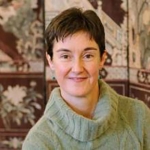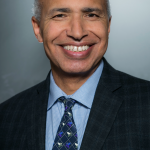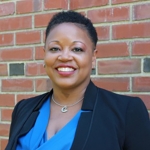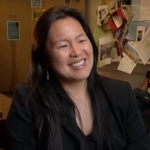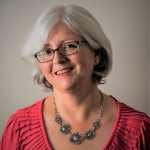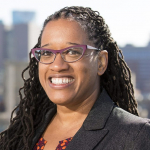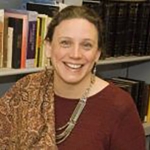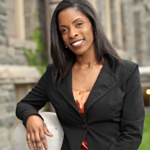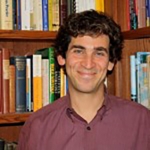Faculty Write Director Jennifer Ahern-Dodson talks with working writers across disciplines about their writing lives. What does it look like when they sit down to write? How do they overcome writing obstacles? When do they find the most joy in their work? Invited guests discuss a range of topics, including cultivating creativity, balancing writing research/teaching/mentoring/ administrative commitments, and the role of peer review and institutional support for their work.
We are all writers. This series aims to build a scholarly writing community and to provide opportunities for us to learn from each other.
This series is co-sponsored by the Forum for Scholars and Publics and the Publishing Humanities Initiative.
Writers From the Series:
Ed Balleisen, History
Ed Balleisen's research explores the historical intersections among law, business, politics, and policy in the modern US, with a focus on the origins, evolution, and impacts of the modern regulatory state. He has pursued projects with historians and other social scientists who study regulatory governance in industrialized and industrializing societies. He serves as Vice Provost for Interdisciplinary Studies.
Nicole Barnes, History
Nicole Barnes researches public health and medicine in twentieth-century China from a gendered perspective, incorporating the changing life stories of men and women into my analysis of how health regulations and medical practices reflect Chinese society's principal values as well as the assumptions and political goals of state actors. Her first book, Intimate Communities: Wartime Healthcare and the Birth of Modern China, 1937-1945 (University of California Press, 2018), has just been published. She has participated in faculty writing groups, retreats, and taken advantage of other Duke resources to support faculty book writers. Nicole joined the Faculty Write Program's First Book Writing Group to discuss her experience writing her first book. She shares her suggestions here.
Abbas Benmamoun is the Vice Provost for Faculty Advancement and Professor of Asian and Middle Eastern Studies and Linguistics. His research focuses on the comparative syntax and morphology of natural language and on heritage languages, particularly on issues of language maintenance and loss within immigrant communities. Dr. Benmanoun is the author of The Feature Structure of Functional Categories, co-author of The Syntax of Arabic, and co-editor of the Routledge Handbook of Arabic Linguistics. Read what Dr. Benmamoun shared about his writing practice here.
Keisha Bentley-Edwards, Samuel DeBois Cook Center on Social Equity, Medicine
Keisha Bentley-Edwards studies how race, racial socialization, and racism affect the health and well-being of children and adults. Beyond identifying disparities, she also investigates the ways that systems can be improved and how cultural strengths can be used to promote resiliency and positive health outcomes in African Americans throughout their lives. Her research has been supported by the Robert Wood Johnson Foundation and the National Institutes of Health, and her work has been published in both scholarly journals and featured in a range of local and national media outlets. Learn more about Dr. Bentley-Edwards research and latest publications here.
Eladio Bobadilla, History
Eladio Bobadilla 's research focuses on 20th century United States history; race and ethnicity; intellectual history; immigration and transnational history; capitalism, labor, and working class history; gender and sexuality; social movements; oral history; digital history and pedagogy; sports history; fascism and antifascism.
Eileen Chow, Asian and Middle Eastern Studies
Eileen Cheng-yin Chow is one of the founding directors of Story Lab at Duke. She is the Director of Graduate Studies for Duke Asian Pacific Studies Institute's East Asian Studies graduate program, and a founding/core faculty member of Duke Asian American and Diaspora Studies. Eileen is interested in all manners of public storytelling, and how to do so as a scholar and teacher. Read what Dr. Chow shared about her writing practice here.
Monique Dufour, Science and Technology Studies, Virginia Tech
Monique Dufour directs the medicine and society minor, has directed the University Writing Program, and was a faculty development consultant at Virginia Tech’s Center for Excellence in Undergraduate Teaching. Dr. Dufour’s research focuses on the history of the book, medical humanities, and literature.
Rebecca Dumlao, Communication, East Carolina University
Rebecca Dumlao was selected in 2018 by North Carolina Campus Compact to be a 2018-2019 Engaged Faculty Scholar. In 2013, Dumlao was recognized as an outstanding service-learning educator, receiving the Robert L. Sigmon Service-Learning Award from NC Campus Compact along with ECU’s Scholarship of Engagement Award. Her recent book — A Guide to Collaborative Communication for Service-Learning and Community Engagement Partners — applies communication scholarship to the field of community engagement. Her conversation with Jennifer Ahern-Dodson and Emily Janke during a North Carolina Engaged Scholars Retreat can be found here.
Peter Felten, History, Elon University
Peter Felten's work focuses on the scholarship of teaching and learning, and he studies student experiences in higher education as well as both individual and institutional change. He has served as president of the International Society for the Scholarship of Teaching and Learning (2016-17) and also of the POD Network (2010-2011), the U.S. professional society for educational developers. His books include the co-authored volumes: The Undergraduate Experience: Focusing Institutions on What Matters Most (Jossey-Bass, 2016); Engaging Students as Partners in Learning and Teaching (Jossey-Bass, 2014); and the co-edited book Intersectionality in Action (Stylus, 2016).
Emily Janke, Peace and Conflict Studies, University of North Carolina Greensboro
In her role as Director of the Institute for Community and Economic Engagement (ICEE), Emily Janke leads and supports initiatives that encourage, support, elevate, and amplify faculty, staff, student, and community colleague community-engaged teaching, learning, research, creative activity, and service. An important aspect of this role is connecting and convening community-engaged scholars within and beyond the university to focus on community-identified priorities through partnership. Emily’s scholar-administrative work focuses on community engagement and public service, community-engaged scholarship, conflict management, innovations in scholarly communications, collaborative communication, and restorative practices. Her conversation with Jennifer Ahern-Dodson and Rebecca Dumlao during the Engaged Scholars Retreat can be found here.
Sally Kornbluth, Pharmacology and Cancer Biology
Sally Kornbluth is a cell biologist and was the James B. Duke Professor of Pharmacology and Cancer Biology. She was appointed Duke University Provost on July 1, 2014. As the university’s chief academic officer, Kornbluth led Duke’s schools and institutes, as well as admissions, financial aid, libraries, information technology and other facets of the university’s academic life. Her writing life includes not only disciplinary research, but also developing university documents such as the university's Strategic Plan. Provost Kornbluth shared how her discipline shapes her writing life as an administrator and the joys and challenges of writing in a new context.
Jacqueline Looney, Senior Associate Dean for Graduate Programs and Associate Vice Provost for Academic Diversity
Jacqueline Looney has served as the senior administrator for the Office of Graduate Student Affairs, where she collaborated with graduate departments, student organizations, and other administrative units to provide services that enhance the academic, social, personal, and cultural needs of graduate students.
Beverly McIver, Art History and Visual Studies
Beverly McIver joined Duke’s Art, Art history & Visual Studies department as the Esbenshade Professor of the Practice in Studio Arts. She is the recipient of numerous grants and awards, among them a Guggenheim Fellowship, an Anonymous Was a Woman Foundation Fellowship, and the Louis Comfort Tiffany Award. Her paintings are in corporate and museum collections around the country including the permanent collection of the North Carolina Museum of Art.
Tania Mitchell, Higher Education Leadership and Policy, University of Minnesota
Tania Mitchell's research and teaching promote both social equity and social change in community engagement. Dr. Mitchell explores the challenges and opportunities of publishing as an engaged scholar, the need for more research that contributes to positive community change, and how she aligns research, teaching, and service as an engaged scholar. Her scholarship has been published in numerous books and journals, and her edited collections include Educating for Citizenship and Social Justice: Practices for Community Engagement at Research Universities (Palgrave MacMillan, 2018) and Black Women and Social Justice Education: Legacies and Lessons (SUNY Press, 2019).
Talisha Haltiwanger Morrison, Writing, University of Oklahoma
Dr. Morrison’s research and administration interests span writing pedagogy, community-based writing, and Black feminist studies. In particular, her research focuses on intersectional approaches to the space and work of writing centers, applying critical race theory and Black feminist perspectives to examine student-tutor experience and the administrative approaches that help shapes those experiences. Her current projects include books on anti-racist writing center administration and the mentoring experiences of Black women graduate and undergraduate students.
Kristen Neuschel, History
Kristen Neuschel's research has focused on aspects of aristocratic life in France. In her work, she makes use of letters, household accounts, muster rolls, inventories of clothing, jewels, furniture and, most recently, weapons from 15th- and 16th-century noblemen and women. In recent years, she has branched out into writing essays, fiction and memoir to reflect on lives in the past with more creative license than conventional scholarship allows and to share those explorations with broader audiences. She served as Director of the Thompson Writing Program.
Laurie Patton, Religion
Laurie Patton is a professor of religion and prior dean of Trinity College at Duke University. She is currently the 17th president of Middlebury. Patton has lectured widely on interfaith issues, religion, and public life, and consulted with White House offices on faith-based initiatives as well as on civic engagement. She recently became president of Middlebury College.
Ann Marie Rasmussen, Germanic Languages & Literature
Ann Marie Rasmussen, professor of Germanic languages and literature, joined the Duke faculty in 1988. She envisioned and implemented the Carolina-Duke Graduate Program in German Studies, which was successfully launched August 2009. Awarded the Dean’s Excellence in Mentoring Award, Rasmussen collaborates actively with graduate student scholars and helps them envision and develop their own scholarly writing lives. Rasmussen is now the Right Honourable John G. Diefenbaker Memorial Chair of German Literary Studies at the University of Waterloo, Canada.
Julie Reynolds, Biology
Julie Reynolds' active research program focuses on pedagogies that promote science literacy, particularly Writing-to-Learn strategies, and her current Writing-to-Learn research is funded by the National Science Foundation.
Deondra Rose, Public Policy
Deondra Rose examines the role that landmark higher education programs like the National Defense Education Act of 1958, the Higher Education Act of 1965, and Title IX of the 1972 Education Amendments have played in shaping American women’s progress in the mid-twentieth century. Her research has appeared in Studies in American Political Development, the Journal of Policy History, the Journal of Women, Politics & Policy, and PS: Political Science & Politics.
Aaron Sachs, History
Aaron Sachs is professor of history at Cornell University, where his general focus is on nature and culture: he wanders through parks, cemeteries, and wilderness areas, stares at landscape paintings and photographs, and re-reads Thoreau, all in an effort to figure out how ideas about nature have changed over time and how those changes have mattered in the western world. Dr. Sachs serves as the faculty sponsor of a radical underground organization at Cornell called Historians Are Writers, which brings together graduate students who believe that academic writing can be moving on a deeply human level.
Roy Scranton, Author
Roy Scranton is the author of Learning to Die in the Anthropocene: Reflections on the End of Civilization and co-editor of Fire and Forget: Short Stories from the Long War. He is a journalist, fiction writer, and US Army veteran of the Iraq war whose work includes critiques of the “trauma hero” in military fiction; the intersection of culture, conflict, and climate change; and his own military-focused fiction.
Kelley Swain, Artist-in-Residence for the Health Humanities Lab at Duke University
Kelley Swain, award-winning writer/poet and contributing writer to the Lancet, works at the crossroads of poetry and science. Medical education in the US has increasingly found the humanities relevant to training more effective and empathetic doctors. Swain considers how narrative medicine and creative writing expand physicians’ writing skills and invite them to explore the humanity in their practice. Is there a similar value for introducing the humanities to Global Health?
Robert Thompson, Psychology & Neuroscience
Robert Thompson is professor emeritus of Psychology and Neuroscience at Duke University, where he has served as head of the division of medical psychology, director of the undergraduate program in human development, Dean of Trinity College of Arts and Sciences, and Vice Povost for Undergraduate Education. Dr. Thompson’s publications include Changing the Conversation about Higher Education (2013) and Beyond Reason and Tolerance: The Purpose and Practice of Higher Education (2014).


